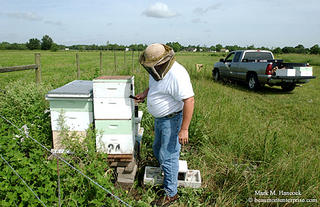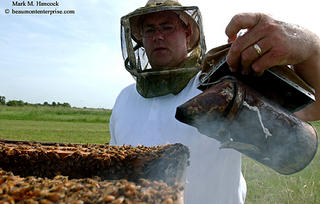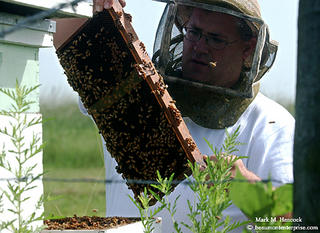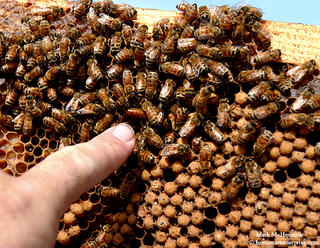
The Rev. Matt Thomas of the Faith United Methodist Church of Fannett pries the lid off his bees in a field in Fannett on Wednesday, July 27, 2005.
Photos by Mark M. Hancock / © The Beaumont Enterprise

Thomas uses smoke before moving his bees. Smoke causes the bees to engorge and makes them less likely to sting the beekeeper.

Thomas inspects his bees for parasites. The bees' social structure gives Thomas a lot of sermon material on hard work, productivity and taking care of one another.

Thomas points out his hive's queen bee. The queen bee is the only female capable of reproducing. Younger queens tend to produce more offspring and allow the hive population to grow and produce more honey.
Before y'all ask. Yup, I got stung. Twice. Once on the eyelid and once on the arm. Yup, it hurt. Yup, I'm mildly allergic to bees.
The bees were cool until I was done shooting. I was about to get into my truck when I saw one out of the corner of my eye. I blinked, and it stung me on the lower eyelid of my left eye. If I hadn't blinked, I'm certain it would have stung my eyeball directly.
So, if anyone has a bee assignment, the closer to the hive the PJ gets, the safer it seems to be. The Kamikaze bees seem to fly on the perimeter.
As an additional safety note, when stung by a honey bee, scrape the stinger out. If you try to squeeze it out like a splinter, it only injects more venom. At least I knew this one helpful hint because my dad raised bees until I was stung by a scorpion and became allergic to bees.
If stung, take Benadryl Maximum Strength antihistamine capsules. Benadryl also produces a topical cream, but I'm not certain it works as well as wet baking soda to releive the pain and remove the venom.
Luckily, honey bees can only sting one time, and then they die (except the queen, who has a strait stinger). Unfortunately once a bee stings someone, it releases pheremones to let the other bees know where to attack.
Enough for now,


6 comments:
Bees are fascinating but Mark you should really be careful. It is not unheard of folks being mildly allegic to bees suddenly become highly allegic to their stings. I kept a couple of hives a year or so ago but I guess I ticked 'em off because both hives swarmed in the fall:-(
Marie,
I can't believe you ticked off anyone in your life. I imagine you taught them all to play miniature instruments, and they went on a world tour (it was sudden, so they forgot to tell you). I'd also imagine they start each show with "Flight of the Bumblebee." ;-)
well done getting so close to them! I had a problem with bees a few weeks back in my composter and I wouldn't go closer than my 300mm zoom needed!
We didn't use the composter for about a week until the left and afterwards I found a few bits of honeycomb inside!
A few days later a huge bee was stuck in our bathroom, buzzing loudly. I swear, that sound evokes a very primitive fear in me and I jumped back when I pushed the door open!
Neither did I until the 2nd one hit me.
Ouch. I hope you're ok. I know the feeling. I was stung in the eye when I was little. I learned then that I was allergic to bees. My face swelled way up, and I couldn't see out of either eye. I had a nice stay in the hospital, though.
Originally posted July 31.
Post a Comment